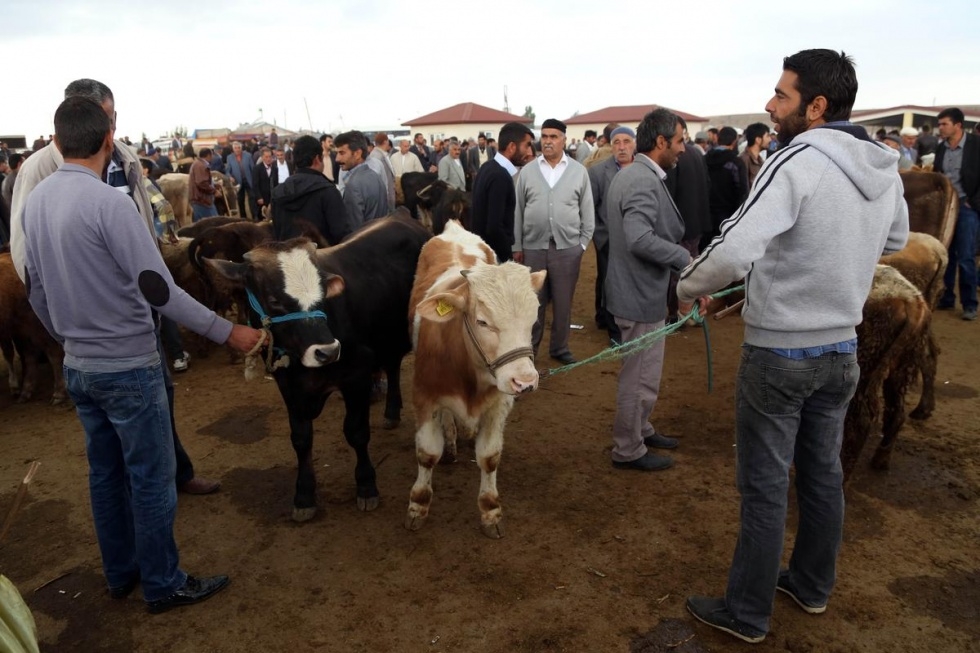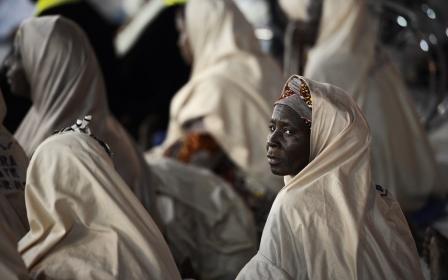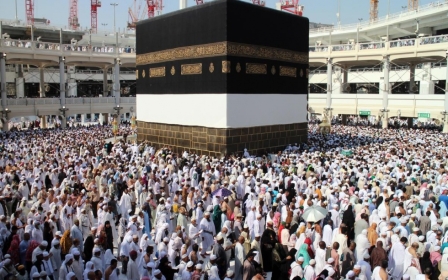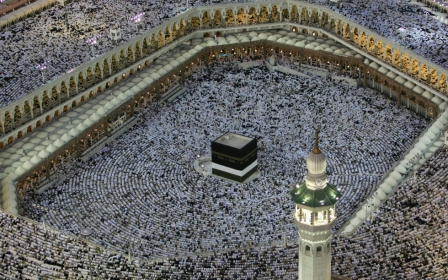Turkey prepares for Eid festivities
Hundreds of thousands of livestock animals will be sold and sacrificed in Istanbul over next few days ahead of major Islamic holiday Eid al Adha

Animals on sale at a special animal market set for the upcoming Muslim festival Eid al-Adha in Turkey (AA)
Published date: 13 February 2015 01:15 GMT
|
Last update: 9 years 9 months ago
By Furkan Naci Top
ISTANBUL - Istanbul is seeing its annual influx of thousands of livestock, breeders and sellers as the Turkish metropolis marks the Islamic celebration of Eid al Adha, the Feast of the Sacrifice.
Istanbulites crowd around temporary markets in open-air spaces or specially converted garages, haggling hot and heavy to buy sheep and cattle to sacrifice.
Turkey's biggest city and commercial capital is now home to hundreds of thousands of animals from all over the country, as many breeders eye this holy period as the largest opportunity to do some business.
Many Muslims will buy and then sacrifice sheep, calves or even camels over the new few days, based on their belief in the religious story of Abraham and his son Ishmael, according to the Holy Quran.
Modern-day Muslims in Turkey follow the religious obligation of sacrificing livestock to display their obedience to God.
Traditionally, people donate the animals’ meat to neighbors, relatives and the poor. Even many secular Turks take this time of year to make charitable donations at home and abroad.
Almost five million head of livestock, including 1.3 million cattle and 3.6 million sheep and goats, are ready to be sacrificed, according to the Turkish Agriculture and Livestock Ministry.
Although the authorities claim there is a surplus of supply of livestock for this year, business is good in Istanbul's markets in the last days before Eid; sellers shout and customers drive a hard bargain.
Pairs of men haggle as they maintain a constant handshake which flies up and down in the air as the duo shout prices to each other, both in search of a good deal.
Even a small amount like $10 is a haggling matter in these noisy encounters.
In an open-air market for sheep and goats in Istanbul's Bayrampasa district, Hasan Konuk is happy. A shoe-seller by trade, he is glad to make four sales in a row in just 10 minutes.
"I am doing this as a hobby," Hasan says between sales, standing on a muddy surface surrounded by the fences which keep his goats and sheep penned in.
His highest sale this year was more than 1,400 lira for one of his best sheep. However, it was a rare moment of triumph since prices generally range between 800 and 1,100 lira for a smaller animal.
"For customers the prices are high," said one buyer, Mehmet Ural, right after some hard bargaining and another long, bruising handshake. Mehmet will have his goat sacrificed in a slaughterhouse next to the area established by the municipality.
Nazmi Ozdemir, who has bred livestock for 30 years, sits with his son-in-law on hay bales while waiting for customers. They are in a large garage which has been converted into a massive barn where cattle, tied to feeding troughs, take the place of cars.
Nazmi, a 57-year-old from the northwestern border city of Edirne, told The Anadolu Agency that he had sold two-thirds of his cattle so far.
He was keen to sell all the animals before the festival’s last day, as taking even one of them back would be costly.
The price tags for bullocks, heifers and calves vary based on the weight of the animals. It costs between 5,000 Turkish lira ($2,200) to 11,000 lira ($5,700) on average for a large animal, 12 times higher than the monthly minimum wage in the country.
According to Islamic customs, seven people can buy a share in one animal; the cost of sacrificing and preparing the meat is around 400 lira.
Another breeder, Habip Ongel working alongside his father and two uncles, brought his animals all the way from the northeastern city of Ardahan in the far corner of Turkey.
Habip also has few animals remaining but, he says, despite a freeze in prices from last year customers’ interest has been lower than last year so far, but hopeful for selling all off.
"It might be the high supply but the real issue is opportunist customers who wait until the last days for lower prices," Habip complains.
Nedim Dagdeviren inherited his profession from his grandfather who emigrated from the Greek city of Thessaloniki in 1924 in a boat filled with 30 sheep.
Nedim is critical of supermarkets which now have sacrificial animal services, where customers can buy their sacrifice in installment payments with a credit card.
"It is three times more expensive," he claims.
Such services offered by supermarkets and aid organizations offer to cut out the middleman; but this has somewhat curbed the classic rituals, often reducing the process to just making a payment and delivering a sacrifice.
The media spotlight will also be on the animals for the next few days, as stories of escaped livestock running amok, in between the city's highways, metro lines and skyscrapers, will make the news.
New MEE newsletter: Jerusalem Dispatch
Sign up to get the latest insights and analysis on Israel-Palestine, alongside Turkey Unpacked and other MEE newsletters
Middle East Eye delivers independent and unrivalled coverage and analysis of the Middle East, North Africa and beyond. To learn more about republishing this content and the associated fees, please fill out this form. More about MEE can be found here.




